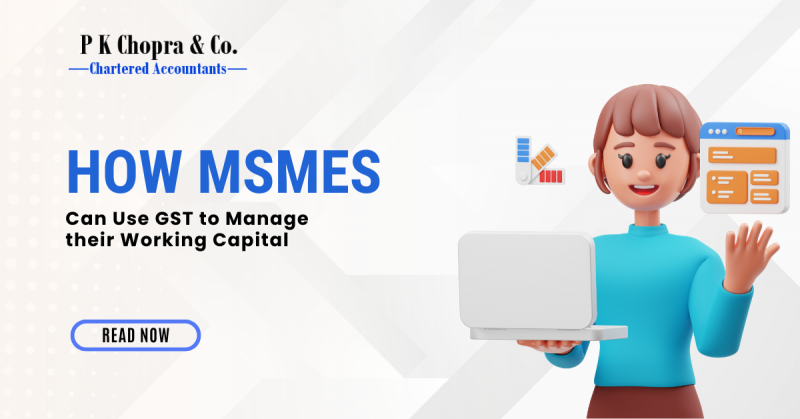How MSMEs can Use GST to Manage their Working Capital
Introduction: Micro, Small, and Medium Enterprises (MSMEs) are the backbone of India’s economy, contributing significantly to employment generation and economic growth. Effective management of working capital is crucial for the sustenance and growth of MSMEs. The implementation of Goods and Services Tax (GST) in India has provided an opportunity for MSMEs to optimize their working capital. In this blog, we will explore how MSMEs can leverage GST to effectively manage their working capital.
- Input Tax Credit (ITC): GST allows businesses to claim Input Tax Credit, which is the credit available for taxes paid on inputs used in the production process. MSMEs can utilize ITC to reduce their tax liability and conserve working capital. By accurately maintaining and reconciling their purchase and sales invoices, MSMEs can claim ITC on eligible inputs, such as raw materials, services, and capital goods.
- Timely Tax Payments and Compliance: MSMEs need to comply with the timely filing of GST returns and payment of taxes. Non-compliance can lead to penalties and interest charges, impacting working capital. By staying compliant and meeting the due dates for GST filings and tax payments, MSMEs can avoid unnecessary financial burdens and maintain a healthy cash flow.
- Cash Flow Management: GST has replaced multiple indirect taxes with a unified tax structure, simplifying tax compliance for MSMEs. The streamlined tax process reduces the time and effort required for tax-related activities, allowing MSMEs to focus on their core business operations. This efficiency gains enable MSMEs to allocate more resources to working capital management and business growth.
- Simplified Tax Structure: GST has replaced multiple indirect taxes with a unified tax structure, simplifying tax compliance for MSMEs. The streamlined tax process reduces the time and effort required for tax-related activities, allowing MSMEs to focus on their core business operations. This efficiency gains enable MSMEs to allocate more resources to working capital management and business growth.
- GST Refunds: MSMEs involved in exports or zero-rated supplies can claim GST refunds on accumulated input tax credits. By following the prescribed procedures and submitting necessary documentation, MSMEs can recover excess taxes paid and improve their working capital position.
- Supply Chain Optimization: GST has facilitated the creation of a seamless nationwide market, eliminating inter-state barriers and reducing logistics costs for MSMEs. This optimization of supply chains can lead to reduced lead times, lower inventory carrying costs, and improved working capital management. MSMEs can explore opportunities to streamline their supply chains, consolidate vendors, and implement efficient inventory management practices.
- Technology Adoption: Leveraging technology and adopting GST-compliant accounting and invoicing software can significantly enhance working capital management for MSMEs. Automated systems enable accurate record-keeping, seamless ITC reconciliation, and generation of timely GST returns. This digital transformation reduces errors, increases efficiency, and provides real-time visibility into cash flows.
Conclusion: The introduction of GST has provided MSMEs in India with a valuable tool to manage their working capital effectively. By leveraging input tax credit, maintaining compliance, optimizing cash flows, and embracing technology, MSMEs can enhance their financial stability and fuel their growth. It is crucial for MSMEs to understand the nuances of GST, seek professional guidance if needed, and leverage the opportunities it offers to drive sustainable success in the competitive business landscape.

